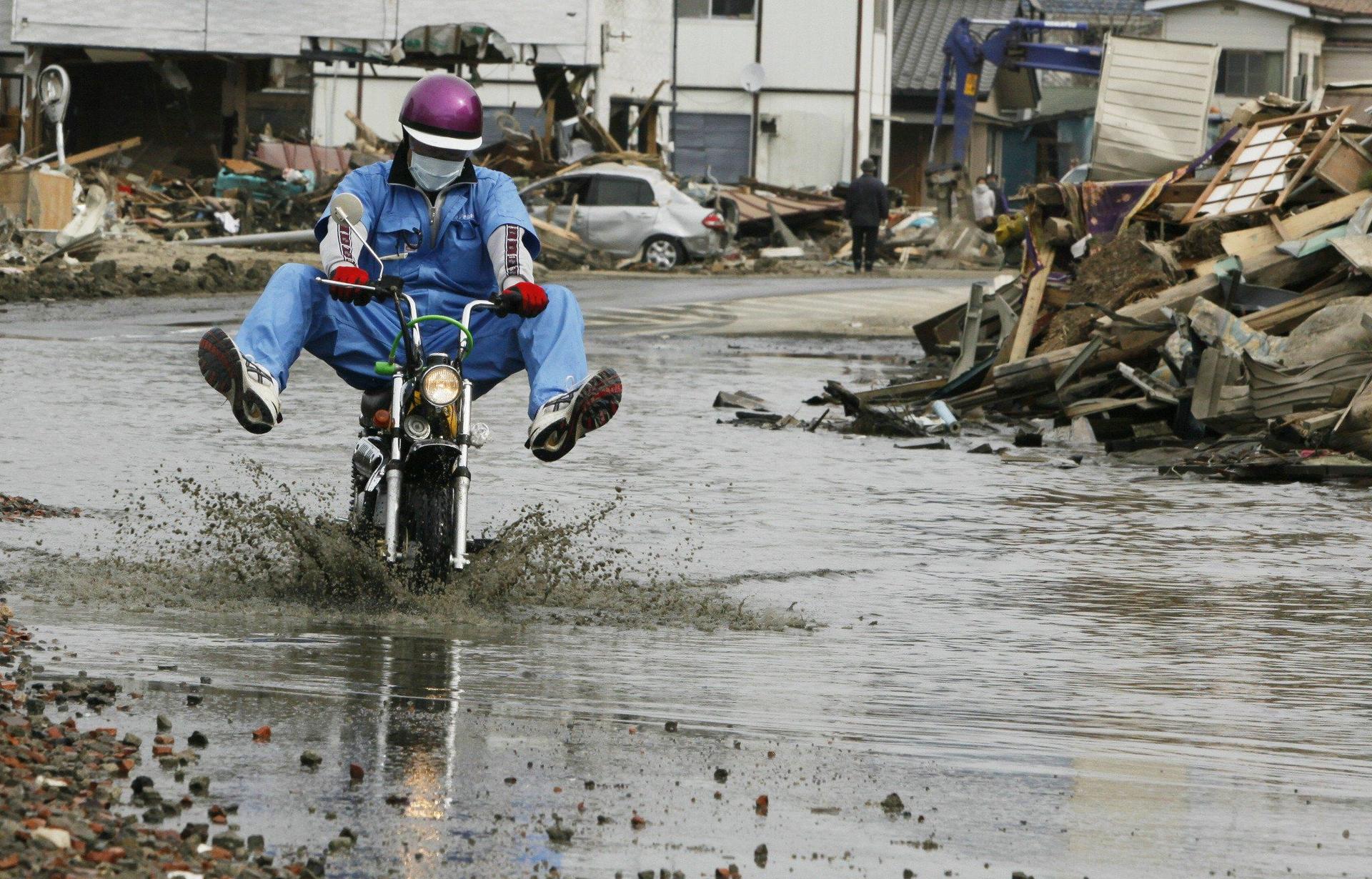Japan says 3 dead after quake, recession likely (UPDATES) (VIDEO)
A man rides a motorcycle through water in Ishinomaki city, Miyagi prefecture on April 8, 2011. A powerful aftershock that rocked an area of Japan still reeling from last month’s earthquake and tsunami disaster killed two people and injured more than 100, emergency services said.
Officials said Friday that three people died and more than 100 were injured in a powerful 7.1-magnitude earthquake that knocked several power plants offline and triggered a tsunami alert.
The news came as Tokyo forecast a grim economic outlook for Japan, with a recession likely by the end of 2011.
Thursday's quake forced work crews at the Fukushima Dai-ichi nuclear power station, crippled by the 9.0-magnitude quake and tsunami on March 11, to evacuate, but they returned to work Friday, CNN reported. No fresh damage to the facility had been reported Friday afternoon, the Tokyo Electric Power Company (Tepco) said.
Toshiba Corp. heads a consortium that has submitted a proposal Japanese government to decommission four troubled reactors at the Fukushima plant, according to a report Friday.
The proposal, according to Xinhua, includes leveling damaged buildings and structures complex and using robots to remove radioactive rubble caused by hydrogen explosions and the March 11 quake.
According to the consortium, made up of Toshiba's Westinghouse Electric Co, Babcock & Wilcox Co. and Shaw Group, involved in the clean-up following the Three Mile Island nuclear crisis in 1979, it would take around 10 years to remove nuclear fuel rods from the four reactors.
Japan's government, meanwhile, said Friday that the Japanese economy was in a "severe condition" following the March 11 earthquake and tsunami, which have left more than 12,700 dead and 14,700 missing to date.
Power blackouts and restrictions, factory shutdowns, and a sharp drop in the number of tourists have left the world's third largest economy reeling. "Japan's economy is suddenly in a severe condition due to the effects of the earthquake," the Cabinet Office said, Reuters reported.
Japan's central bank said Friday that power shortages resulting from the crippled state of the Fukushima Dai-ichi nuclear power plant north of Tokyo would contribute to the downturn. The radiation leakages from the damaged Fukushima plant constitute the world's worst nuclear disaster since Chernobyl.
Rolling power cuts have been introduced and people across Japan are being asked to conserve energy, the BBC reports.
General Electric, maker of the plant, said this week it would help the plant's operator supply electricity in the coming summer when power demand soars.
GE chief executive, Jeff Immelt, met with officials at Tepco, Japan's biggest utility, about the crippled plant, although details on how GE would help ensure supply electricity, or what other assistance was offered by Immelt were not provided.
"Immelt said GE would cooperate with Tepco on restarting and strengthening its thermal power generation in anticipation of the rise in power demand for the summer," a Tepco official told a webcast news briefing, Reuters reported.
"As one of the manufacturers (of the reactors), he wanted to say GE wants to provide ideas to help resolve the situation."
Japan is meantime facing increasing concern from its neighbors with China about the pumping of radioactive water into the sea from a crippled nuclear plant in an effort to cool the reactors and contain radiation leaks.
China's Foreign Ministry said it would "closely" monitor Japan's actions to end the crisis at the plant, and demanded "swift, comprehensive and accurate" information from Tokyo.
"As Japan's neighbor, we naturally express our concern about this," ministry spokesman Hong Lei said in a statement, believed to be the first public expression of concern over a crisis by another country. Other countries have banned or restricted food imports from Japan over radiation fears.
Those who died during Thursday's quake included an 85-year-old man who collapsed while trying to get to a shelter, a 79-year-old man and a woman, 63, who died after a power outage caused by the quake stopped her oxygen, CNN reports.
Of 132 people were injured, 17 were in serious condition, according to Japan's National Police Agency.
The Japan Meteorological Agency rated the Thursday quake, which struck in the ocean off Sendai, a magnitude 7.4, while the U.S. Geological Survey put it at 7.1, CNN reports. It was considered an aftershock from the magnitude 9 quake and tsunami that struck nearby March 11.
Every day, reporters and producers at The World are hard at work bringing you human-centered news from across the globe. But we can’t do it without you. We need your support to ensure we can continue this work for another year.
Make a gift today, and you’ll help us unlock a matching gift of $67,000!
